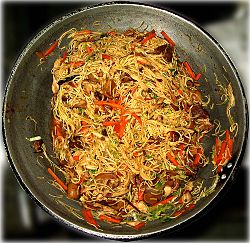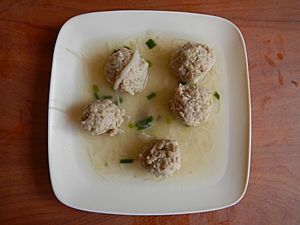Misua facts for kids

Fried misua with vegetables
|
|
| Alternative names | Wheat vermicelli |
|---|---|
| Type | Chinese noodles |
| Place of origin | China |
| Region or state | Fujian |
| Main ingredients | Wheat flour |
| Misua | |||||||||||
|---|---|---|---|---|---|---|---|---|---|---|---|
| Chinese name | |||||||||||
| Traditional Chinese | 麵線 | ||||||||||
| Simplified Chinese | 面线 | ||||||||||
| Literal meaning | noodle threads | ||||||||||
|
|||||||||||
| Khmer name | |||||||||||
| Khmer | មីសួ (mii suə) | ||||||||||
Misua (also called mee sua or miswa) is a type of very thin noodle. It is also known as wheat vermicelli. These noodles are made from wheat flour and have a little salt. Misua first came from Fujian, a region in China.
Misua noodles are different from other popular noodles. For example, mifen (rice vermicelli) is made from rice. Cellophane noodles are made from mung beans. Misua is special because it is made from wheat.
What is Misua?
Misua noodles are made from wheat flour. They are very thin and look like threads. Cooking misua is super fast! It usually takes less than two minutes in boiling water. Sometimes, it cooks even faster than that.
Misua in Culture
Misua is a very important food in Chinese culture. People often eat it during special parties and celebrations. It is popular in mainland China and many other countries. These include Cambodia, Malaysia, Indonesia, Singapore, Vietnam, Brunei, Thailand, and Myanmar. It is especially popular in Taiwan and the Philippines. These countries have many people who came from Fujian, China.
Misua and Long Life
In Chinese culture, misua noodles stand for a long life. Because of this, misua is a traditional food for birthdays. People often try not to chew or cut the noodles. This is because long noodles mean a long life.
Misua is usually served with many different ingredients. These can include eggs, tofu, bell peppers, oysters, and shiitake mushrooms. Other common additions are beef, shallots, scallions, roasted nuts, or fried fish.
Misua in Taiwan
In Taiwan, there are two main kinds of misua. One kind is plain and white. The other kind is steamed at a very high heat. This steaming makes it turn a light brown color. This process is called caramelizing.
For birthdays, people in Taiwan usually eat the plain misua. It is often served with pork hocks in a stewed broth. This is a special birthday tradition. The brown misua is different because it can cook for a long time without falling apart. It is used in a popular Taiwanese dish called oyster vermicelli.
See also
 In Spanish: Misua para niños
In Spanish: Misua para niños
 | Tommie Smith |
 | Simone Manuel |
 | Shani Davis |
 | Simone Biles |
 | Alice Coachman |


